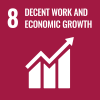El Salvador, 14 December 2023 – The birth of their firstborn child, Victoria, was a moment of great joy for Mariella Ramirez and her husband. Originally from El Salvador, they decided to cross the border to Guatemala, where they found better job opportunities to help their family flourish. However, the joy from the birth of a new baby soon turned into frustration: without proper documents, they couldn’t return to El Salvador to introduce Victoria to the rest of their family.

The border neighbourhood transit card campaign is an important effort to improve migration governance and facilitate regular migration alternatives. Photo: IOM/Noe Alvarado.
“The offices to obtain a passport are very far from our home, and it takes a lot of money and time to go there and complete that process,” Mariella says.
Mariella and her husband are not unique. Migration has always been integral to communities who share similar cultures and customs on both sides of the border. Due to their distance from the economic and political centres of their own countries, people here have historically crossed borders in search of better opportunities.

Ruth Nohemy Lorenzana and her daughter, Ivania, obtained the border card. Family reunification is one of the main reasons why the Salvadoran immigration authorities decided to expand the scope of the ID campaigns. Photo: IOM/Noe Alvarado.
Mariella's maternal grandmother and sisters, who still reside in El Salvador, eagerly awaited the moment when they could embrace both her and baby Victoria.
Fortunately, she learned that an initiative for issuing border transit cards would take place in the area where she lived. The card which is issued by the government of El Salvador and supported by the International Organization for Migration (IOM), would allow her daughter to cross the border without the need for a passport, facilitating future family reunions.

Authorities expect transit cards to contribute to sustainable development in border communities. Photo: IOM/Noe Alvarado.
It allows children with Salvadoran parents, adolescents and their families living in the border region to access basic services such as health and education, ensuring their well-being and development.
This border card also facilitates trade between the two regions, promoting economic development and creating opportunities for growth and prosperity in border communities.
A border card like the one offered by the government of El Salvador contributes to achieving Goal 11 of the Global Compact for Migration, which seeks to have States manage their borders in an integrated, safe and coordinated manner.

Hundreds of families from the border communities between El Salvador and Guatemala have benefited from this initiative. Photo: IOM/Noe Alvarado
"The card will allow us to cross the border and reunite with our family. My daughter will be able to be with her loved ones without any problems. It's a great help, and we'll be able to create special memories. Now, we can embrace our loved ones in El Salvador whenever we want, without worrying about the costs and the distance," Mariella added.
Alongside little Victoria, 1,275 other children and adolescents obtained this card in 2023, which serves as an example of how measures can be implemented to enable safe and swift transit, promoting the well-being and development of border communities.

The border card also seeks to promote the well-being of communities, facilitating safe and timely transit. Photo: IOM/Noe Alvarado.
The meeting between Victoria and her maternal family reminds us of the power of family ties and love that transcends borders. For families like hers, properly managed migration can be a hopeful and opportunity-filled alternative with the potential to transform communities for the benefit of all.
Text by José Miguel Gómez and Tiffany Chicas, IOM El Salvador.



